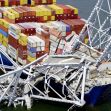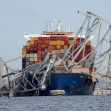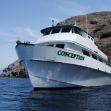After a container ship plowed into the Francis Scott Key Bridge earlier this year, the families of three construction workers who lost their lives in the accident are pursuing legal action against the ship's owners. This decision follows the catastrophic collision of the cargo ship Dali into the bridge on March 26, which resulted in the deaths of six workers who were repairing potholes at the time of the crash. The ship's owner, Singapore-based Grace Ocean Private Limited, and the vessel’s manager, Synergy Marine Group, have sought to limit their liability in U.S. District Court in Baltimore.
On the day of the incident, the Dali lost electrical power numerous times before departing from the Port of Baltimore. As the vessel, which stretches nearly 1,000 feet in length, approached the bridge, it collided with one of its support piers, leading to the deadly collapse. Six men tragically died, while two others were rescued from the Patapsco River.
In response to the disaster, the companies involved filed a petition in federal court, seeking to limit their liability to the value of the ship, an estimated $42.5 million. Their petition alleges that the crash occurred without any fault or neglect on their part, invoking legal protections under maritime law. Specifically, under the Limitation of Liability Act, a shipowner can attempt to limit their responsibility for damages to the value of the ship if the incident occurred without their knowledge or direct involvement. However, if it can be proven that the shipowners were negligent or had knowledge of potential risks, this limitation can be contested.
In a press conference on Tuesday, the families of the victims announced that they are challenging the petition. Represented by attorney Matthew Wessler, the families of three of the deceased workers—Miguel Angel Luna Gonzales, Jose Mynor Lopez, and Dorlian Ronial Castillo Cabrera—expressed their opposition to the shipowners' attempt to restrict their financial responsibility.
Gustavo Torres, the executive director of immigrant advocacy organization CASA, also voiced his support for the families at the recent press conference, stating, “No financial loss can compare to the loss of human life.” He emphasized that the victims, all Latin American immigrants, were performing crucial work at the time of the accident and came to the U.S. seeking better opportunities and a brighter future. CASA condemned the owners of Grace Ocean Private Limited for their attempt to “wash their hands of responsibility” and has called for enhanced protections for migrant workers.
The court filings suggest that there may have been some negligence on the part of the shipowners or managers. According to preliminary reports from the National Transportation Safety Board (NTSB), the ship experienced power issues twice before it departed the port. If the ship's operators knew of the power failures and allowed the vessel to continue its journey, it could amount to negligence, weakening the company's claim to limit liability.
At the heart of the legal dispute is the question of responsibility. Maritime law provides shipowners with certain protections, but these are not absolute. If the court determines that the crash was preventable and that the companies involved acted with negligence or failed to maintain proper care, they could lose the ability to limit their liability. A federal judge will ultimately decide whether the companies can invoke this limitation or whether a trial will proceed to determine the full extent of the damages owed to the families and other affected parties.






